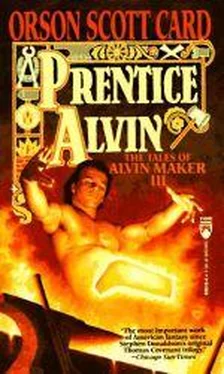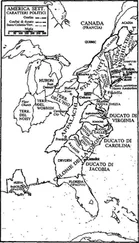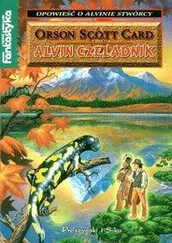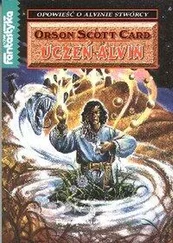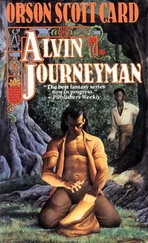Orson Card - Prentice Alvin
Здесь есть возможность читать онлайн «Orson Card - Prentice Alvin» весь текст электронной книги совершенно бесплатно (целиком полную версию без сокращений). В некоторых случаях можно слушать аудио, скачать через торрент в формате fb2 и присутствует краткое содержание. Жанр: Фантастика и фэнтези, на английском языке. Описание произведения, (предисловие) а так же отзывы посетителей доступны на портале библиотеки ЛибКат.
- Название:Prentice Alvin
- Автор:
- Жанр:
- Год:неизвестен
- ISBN:нет данных
- Рейтинг книги:5 / 5. Голосов: 1
-
Избранное:Добавить в избранное
- Отзывы:
-
Ваша оценка:
- 100
- 1
- 2
- 3
- 4
- 5
Prentice Alvin: краткое содержание, описание и аннотация
Предлагаем к чтению аннотацию, описание, краткое содержание или предисловие (зависит от того, что написал сам автор книги «Prentice Alvin»). Если вы не нашли необходимую информацию о книге — напишите в комментариях, мы постараемся отыскать её.
Prentice Alvin — читать онлайн бесплатно полную книгу (весь текст) целиком
Ниже представлен текст книги, разбитый по страницам. Система сохранения места последней прочитанной страницы, позволяет с удобством читать онлайн бесплатно книгу «Prentice Alvin», без необходимости каждый раз заново искать на чём Вы остановились. Поставьте закладку, и сможете в любой момент перейти на страницу, на которой закончили чтение.
Интервал:
Закладка:
Miss Larner watched Old Peg walk away. Mother, she whispered. No, didn't even whisper. Didn't even open her mouth. But her lips pressed together a bit tighter with the M, and her tongue shaped the other sounds inside her mouth.
It hurt her, to deceive. She had promised never to lie, and in a sense she wasn't lying even now. The name she had taken, Larner, meant nothing more than teacher, and since she was a teacher, it was as truly her name as Father's name was Guester and Makepeace's name was Smith. And when people asked her questions, she never lied to them, though she did refuse to answer questions that might tell them more than they ought to know, that might set them wondering.
Still, despite her elaborate avoidance of an open lie, she feared that she merely deceived herself. How could she believe that her presence here, so disguised, was anything but a lie?
And yet surely even that deception was the truth, at its root. She was no longer the same person she had been when she was torch of Hatrack River. She was no longer connected to these people in the former ways. If she claimed to be Little Peggy, that would be a deeper lie than her disguise, for they would suppose that she was the girl they once knew, and treat her accordingly. In that sense, her disguise was a reflection of who she really was, at least here and now-- educated, aloof, a deliberate spinster, and sexually unavailable to men.
So her disguise was not a lie, surely it was not; it was merely a way to keep a secret, the secret of who she used to be, but was no longer. Her vow was still unbroken.
Mother was long since out of sight in the woods between the springhouse and the inn, but still Peggy looked after her. And if she wanted, Peggy could have seen her even yet, not with her eyes, but with her torch sight, finding Mother's heartfire and moving close, looking tight. Mother, don't you know you have no secrets from your daughter Peggy?
But the fact was that Mother could keep all the secrets she desired. Peggy would not look into her heart. Peggy hadn't come home to be the torch of Hatrack River again. After all these years of study, in which Peggy had read so many books so rapidly that she feared once that she might run out, that there might not be books enough in America to satisfy her-- after all these years, there was only one skill she was certain of. She had finally mastered the ability not to see inside the hearts of other people unless she wanted to. She had finally tamed her torchy sight.
Oh, she still looked inside other people when she needed to, but she rarely did. Even with the school board, when she had to tame them, it took no more than her knowledge of human nature to guess their present thoughts and deal with them. And as for the futures revealed in the heartfire, she no longer noticed them.
I am not responsible for your futures, none of you. Least of all you, Mother. I have meddled enough in your life, in everyone's lives. If I know all your futures, all you people in Hatrack River, then I have a moral imperative to shape my own actions to help you achieve the happiest possible tomorrow. Yet in so doing, I cease to exist myself. My own future becomes the only one with no hope, and why should that be? By shutting my eyes to what will happen, I become like you, able to live my life according to my guesses at what may happen. I couldn't guarantee you happiness anyway, and this way at least I also have a chance of it myself.
Even as she justified herself, she felt the same sour guilt well up inside her. By rejecting ber knack, she was sinning against the God that gave it to her. That great magister Erasmus, he had taught as much: Your knack is your destiny. You'll never know joy except through following the path laid out before you by what is inside you. But Peggy refused to submit to that cruel discipline. Her childhood had ahrady been stolen from her, and to what end? Her mother disliked her, the people of Hatrack River feared her, often hated her; even as they came to her again and again, seeking answers to their selfish, petty questions, blaming her if any seeming ill came into their lives, but never thanking her for saving them from dire events, for they never knew how she had saved them because the evils never happened.
It wasn't gratitude she wanted. It was freedom. It was a lightening of her burden. She had started bearing it too young, and they had shown her no mercy in their exploitation. Their own fears always outweighed her need for a carefree girlhood. Did any of them understand that? Did any of them know how gratefully she left them all behind?
Now Peggy the torch was back, but they'd never know it. I did not come back for you, people of Hatrack River, nor did I come to serve your children. I came back for one pupil only, the man who stands even now at the forge, his heartfire burning so brightly that I can see it even in my sleep, even in my dreams. I came back having learned all that the world can teach, so I in turn can help that young man achieve a labor that means more than any one of us. That is my destiny, if I have one.
Along the way I'll do what other good I can-- I'll teach Arthur Stuart, I'll try to fulfill the drearns his brave young mother died for; I'll teach all the other children as much as they're willing to learn, during those certain hours of the day that I've contracted for; I'll bring such poetry and learning into the town of Hatrack River as you're willing to receive.
Perhaps you don't desire poetry as much as you would like to have my torchy knowledge of your possible futures, but I daresay poetry will do you far more good. For knowing the future only makes you timid and complacent by turns, while poetry can shape you into the kind of souls who can face any future with boldness and wisdom and nobility, so that you need not know the future at all, so that any future will be an opportunity for greatness, if you have greatness in you. Can I teach you to see in yourselves what Gray saw?
Some heart once pregnant with celestial fire, Hands that the rod of empire might have swayed, Or waked to ecstasy the living lyre.
But she doubted that any of these ordinary souls in Hatrack River were really mute, inglorious Miltons. Pauley Wiseman was no secret Caesar. He might wish for it, but he lacked the wit and self-control. Whitley Physicker was no Hippocrates, however much he tried to be a healer and conciliator-- his love of luxury undid him, and like many other well-meaning physician he had come to work for what the fee could buy, and not for joy of the work itself.
She picked up the water bucket that stood by the door. Weary as she was, she would not allow herself to seem helpless even for a moment. Father and Mother would come and find Miss Larner had already done for herself all that she could do before the tub arrived.
Ching-ching-ching. Didn't Alvin rest? Didn't he know the sun was boiling the western sky, turning it red before sinking out of sight behind the trees? As she walked down the hill toward the smithy, she felt as if she might suddenly begin to run, to fly down the hill to the smithy as she had flown the day that Alvin was born. It was raining that day, and Alvin's mother was stuck in a wagon in the river. It was Peggy who saw them all, their heartfires off in the blackness of the rain and the flooding river. It was Peggy who gave alarm, and then Peggy who stood watch over the birthing, seeing Alvin's futures in his heartfire, the brightest heartfire she had ever seen or would ever see in all her life. It was Peggy who saved his life then by peeling the caul away from his face; and, by using bits of that caul, Peggy who had saved his life so many times over the years. She might turn her back on being torch of Hatrack River, but she'd never turn her back on him.
But she stopped herself halfway down the hill. What was she thinking of? She could not go to him, not now, not yet. He had to come to her. Only that way could she become his teacher; only that way was there a chance of becoming anything more than that.
Читать дальшеИнтервал:
Закладка:
Похожие книги на «Prentice Alvin»
Представляем Вашему вниманию похожие книги на «Prentice Alvin» списком для выбора. Мы отобрали схожую по названию и смыслу литературу в надежде предоставить читателям больше вариантов отыскать новые, интересные, ещё непрочитанные произведения.
Обсуждение, отзывы о книге «Prentice Alvin» и просто собственные мнения читателей. Оставьте ваши комментарии, напишите, что Вы думаете о произведении, его смысле или главных героях. Укажите что конкретно понравилось, а что нет, и почему Вы так считаете.
